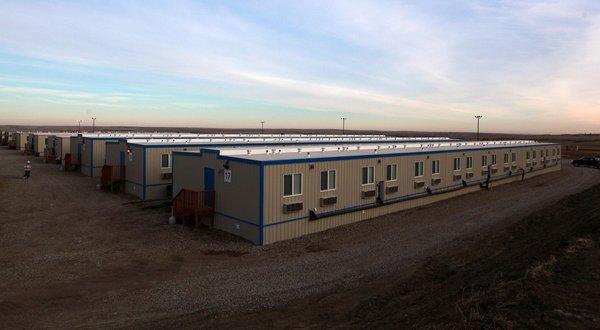Developers Go To War With Man Camps Over Dwindling Demand For Housing In The Oil Patch

Oil prices are down, oil and gas development has slowed, and oil workers are leaving the state.
The latest unemployment numbers from North Dakota Job Service show an unemployment rate of 2.9 percent in August, the last month for which numbers are available, up slightly from 2.7 percent in August 2014. Yet that rate doesn’t tell the full story. According to the federal Bureau of Economic Analysis, unemployment insurance payments to state workers have skyrocketed more than 115 percent in the second quarter of 2015 compared to the second quarter of 2014. That’s because workers are collecting unemployment benefits on the jobs they had in North Dakota, but moving back to other states.
What that’s adding up to is diminished demand for housing in the oil patch, and a fight between permanent housing developers and companies that run temporary “man camps.” The former, with an assist from some local officials like Williston Mayor Howard Klug (himself a part-owner of a hotel in the past) want to drive the latter out of the market.
I write about it at Watchdog today:
“I’d rather sit here and negotiate with someone who wants to bring retail into my town or build me a convention center or something like that down the road,” Klug said during a Sept. 22 city commission meeting at which an ordinance was passed sunsetting permits for man camps on July 1, 2016. “We are looking for permanent situations to our situation, as well as being accommodating to the industry that has helped us build this town.”
But a spokesman for Target Logistics said it’s unrealistic to expect many oil field workers to buy into permanent housing.
“A long-term stay hotel or an apartment building really isn’t a viable option for these workers,” Randy Pruett told Watchdog. “They’re rotational workers. They come in for two months and go out for two months. The city wants all these people to move into apartments or buy homes and that’s just not going to happen.”
At the commission meeting, Klug cited hotel and apartment occupancy rates in arguing for sunsetting crew camp permits.
“The current vacancy rate is 35 percent, or 1,248 vacant hotel beds. Combined, there are 4,090 vacant rental apartment bedrooms and hotel beds currently in Williston, Williams County,” Klug said per the minutes. “If 100 percent of the man camp beds were removed from the market, there would still be a surplus supply of 1,291 bedrooms and beds in the market counting hotels and apartments.”
I tried to speak with Klug for this story, but he canceled a phone interview we had scheduled and didn’t respond to a follow-up request for a call.
Meanwhile the folks at Target Logistics – which operates a dozen camps in North Dakota – say they’re being attacked because developers want to keep their properties full. They also pointed out that permanent housing simply isn’t something a lot of oil workers want:
“A lot of I think what’s driving some of the fires here in Williston is the fact that a lot of these developers are worried that their properties will struggle or go into foreclosure, which is actually a bigger problem for the city than anything,” [Regional Target Logistics Vice President Travis] Kelley said. “The city is protected from that under what we do mainly because of the performance bond that we put up. There’s no way that we’re going to be a liability for the city.”
Kelley also criticized Klug’s preference for permanent housing, saying the demand for housing in cities like Williston is temporary.
“If you think this type of workforce is going to set up roots in Williston you just don’t understand the work force,” he said. “I think that’s what the city leaders are struggling with. I get that they want to grow their community. I live in Williston, I own a home here. I get that.”
One key point the Target Logistics folks made is that they are required to file a reclamation plan for the land they put their camps on. This plan details exactly how they plan to move their facilities off the land if they decide to close down. Not only that, companies like Target Logistics are required to back up those plans with a financial bond which is forfeit if they don’t follow through.
What this means is that if demand falls for man camps, the man camps go away. What doesn’t go away, at least not as easily, are empty motels and apartment buildings.
Another point I didn’t mention in the article is that the man camps have tight controls on things like alcohol, drugs, and other types of illegal or problematic behavior. Given the concerns over oil patch crime, this seems like a benefit over things like apartments and motels where controls don’t exist or at least are much harder to implement.
Regardless, it seems like poor public policy to chase out temporary camps when a) there still seems to be sufficient demand to keep them open b) even demand dwindles the camps will go away and c) inflating demand for what is undoubtedly an already overbuilt market for apartments and hotel rooms seems like a really, really bad idea right now.




